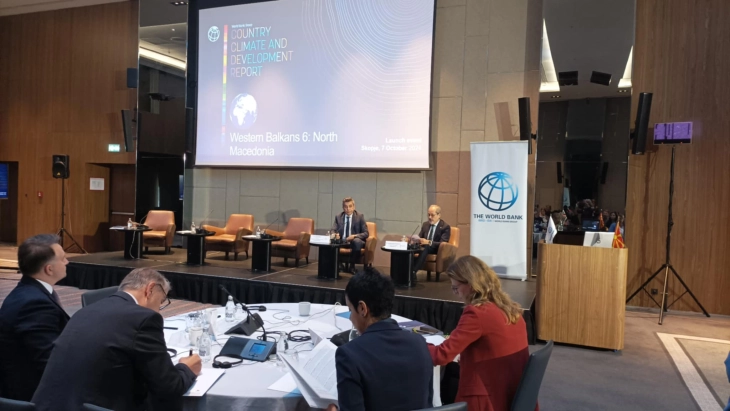World Bank: North Macedonia needs to invest $6.4 billion in climate resilience
- North Macedonia could face economic damages of up to 4 percent of its gross domestic product (GDP) by 2050 due to the impact of changing climate in the absence of investments for adaptation, according to the report.

Skopje, 7 October 2024 (MIA) - North Macedonia needs to invest US$6.4 billion over the next decade to effectively protect people and property against the impacts of climate change. Each dollar from these investments now will deliver two to ten times more return in the future due to evaded losses and economic co-benefits. North Macedonia could become a country with net zero emission if it invested US$5.6 billion until 2050 in decarbonization of energy, the transport industry and the construction. But these are huge figures and the government cannot meet these figures alone, so 85 percent of decarbonization could come from the private sector, said Massimiliano Paolucci, World Bank Country Manager for Kosovo and North Macedonia, presenting the Country Climate and Development Report (CCDR) for North Macedonia.
North Macedonia could face economic damages of up to 4 percent of its gross domestic product (GDP) by 2050 due to the impact of changing climate in the absence of investments for adaptation, according to the report.
“Overall, with the green transition, about 66,000 workers in North Macedonia will be at the highest risk of losing their jobs and will need to change their occupations. Therefore, the country will need to adapt the education system and social protection mechanisms to respond to these emerging demands, retrain people, and build up a health system to support the green transition, increase resilience to climate shocks, and adjust to changing disease patterns,” says the report.

Losses from disasters and extreme climate events have totalled an estimated US$667 million over the past 20 years in North Macedonia.
Regarding decarbonization, mobilizing financing for the green transition entails issuing green bonds, accessing public-private partnerships (PPPs), and tapping into EU pre-accession and guarantee funds.
“North Macedonia would need to invest in the energy system an additional US$1.7 billion until 2030 and US$5.6 billion until 2050 to achieve economy-wide net zero. This investment is incremental to the discounted investments required in the RS, which amount to US$22.1 billion until 2030 and US$48.0 billion until 2050 (in 2020 US dollars). The incremental investment is equivalent to about 2.5 percent of GDP until 2030 and 2.6 percent until 2050, on average. Approximately 82 percent of the investments could come from the private sector, including households. However, the higher investment required would be at least partially compensated by lower operating costs, estimated at -1.3 percent of GDP per year on average through 2050,” says the report.
“Reaching net zero by 2050 is possible for North Macedonia but will require stepping up investments significantly. Mobilizing private capital will be essential to accelerate the green transition and spur long-term sustainable growth,” said Nicolas Marquier, IFC Regional Manager for the Western Balkans.

According to the World Bank, fiscal policy is key to accelerate the transition to a greener economy. North Macedonia Climate Public Finance Review, presented today alongside the CCDR, underscores that tax policies could incentivize renewable energy, green transportation and sustainable technologies by removing subsidies for coal-fired electricity while protecting vulnerable households from increased energy costs.
Climate budget tagging and green procurement processes can help with monitoring green finances and boost green purchases, says the review.
The Climate Public Finance Review also highlights the urgency of implementing carbon pricing to reduce greenhouse gas emissions and generate significant state revenue, potentially up to EUR 730 million annually that could be used for needed mitigation and adaptation investments and just transition.
“Revenues from carbon pricing could support households and businesses during the green transition and would provide other co-benefits such as improved air quality and health in North Macedonia,” said Sanja Madzarevic-Sujster, senior economist at the World Bank and the lead author of the report.
Addressing the event, First Deputy Prime Minister and Environment Minister Izet Mexhiti said that climate risks pose a threat to stability of the economy, public health and environment.

“Local and global efforts for decarbonization underscore the need for strong policies and financing frameworks and the need for well-planned and comprehensive climate actions. Thus, the two World Bank reports will be of great importance for the country toward decarbonization and resilience toward climate change,” stated Mexhiti.
The government, he added, is aware of the need for restructuring and implementing systems and disaster risk management plans, of the need to transform the energy sector and modernize agriculture as well as to implement energy efficiency strengthening programs.
“A climate action bill is in the works, which includes remarks and the opinions by all relevant institutions are completed. We expect it to be sent to the government by mid-October,” said Mexhiti.
Photo/video: MIA







